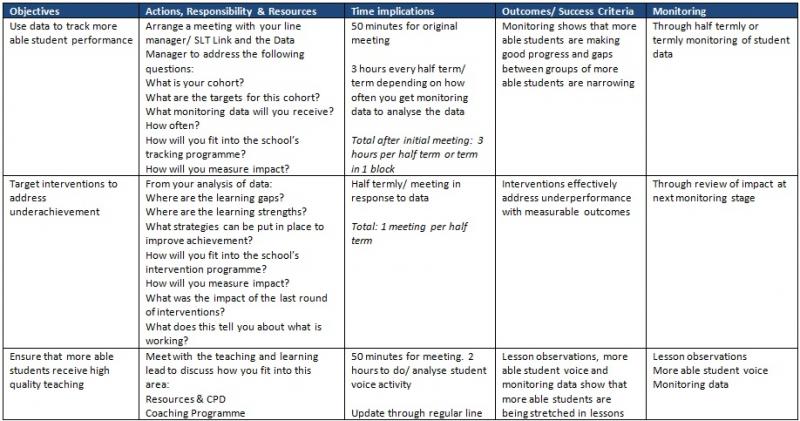- Latest NewsUp-to-date articles giving you information on best practice and policy changes.
- Skills AuditsEvaluate your skills and knowledge, identify gaps and determine training needs.
Managing more able provision in 2 hours a week
Managing gifted and talented teaching under time pressure is no easy task. Use these 5 practices to tackle your responsibilities in no time.
1. Use data to track more able pupil performance
Key questions
- What are the school’s achievement priorities? Where does more able achievement appear?
- Where do you fit? Is it your role to track more able pupils or will someone else give you this information?
Action plan
Identify your focus and your cohort from the start. You need to work as part of a bigger team focusing strategically on improving achievement.
Work within existing school systems: get the same monitoring data, at the same times, in the same way. Look at the progress that more able pupils are making in order to identify:
- pupils who are making better than expected progress – how can good practice be shared?
- pupils who are making less than expected progress – what strategies need to be put in place to address this?
- trends across key groups – are disadvantaged pupils making as much progress as non-disadvantaged pupils for example? Make sure that you're aware of key subgroups such as gender, disadvantage and ethnicity.
Clarify responsibilities: look at more able data yourself – but remember to draw on your line manager, senior leadership team link or data manager too.
Reflect: For all your data tracking you need to be asking: Why is this happening? Where is this happening? What characteristics do these pupils have?
2. Target interventions to address underachievement
Key questions
- What is your data telling you?
- What strategies could improve achievement and how will you measure their impact?
- What are the strengths to celebrate and the learning gaps to plug?
- Is intervention your responsibility?
Action plan
Go to your line manager or SLT link to discuss strategies, remembering that Ofsted recommend regular measurement of interventions to ensure impact and correct focus. Be clear that you are part of the wider intervention team and clarify your responsibilities.
Work with departments on interventions to support underachieving more able pupils. Use methods including:
- teacher intervention
- learning or peer coaches
- more able achievement contracts.
Remember: You are not alone. Your line manager or SLT link will be experienced in identifying improvement strategies. Use the expertise of those tracking pupil premium pupils to adopt best practice quickly.
3. Ensure that more able pupils receive high quality teaching
Key questions
- How do more able pupils fit into school plans for improving teaching and learning?
- What practice can be shared and how can teaching be supported in weaker areas?
Action plan
High quality teaching means successful outcomes. Be familiar with the ingredients of a stretch and challenge lesson: Lesson Ingredients for Learning is a straightforward and up-to-date guide.
Don’t reinvent the wheel; use existing resources for stretch and challenge when possible:
Use your school’s teaching and learning lead. Discuss possible strategies after you’ve seen pupil data, so you can focus on strengths and weaknesses in more able achievement.
Consider pupil voice to find out from more able pupils about what is helping them to learn effectively, involving teachers and departments in the consultation process.
Improve: Share best practice resources to encourage high quality teaching - consider implementing an open classroom policy.
4. Grow resilient and effective more able learners
Key questions
- Does the school currently emphasise the importance of independent, curious and engaged learners?
- Are pupils adopting fixed mindsets about achievement?
Action plan
Carry out a staff voice survey to find out the barriers to learning of your more able pupils. Push pupils to venture beyond their existing skills and ensure staff focus on their particular needs. Make sure your teachers are equipped to challenge pupils' fixed mindsets by encouraging:
- teacher CPD
- the coaching programme
- teaching and learning working parties, self-review and work scrutiny processes
- sharing good practice.
If you are a form tutor, suggest that you use this time instead to work with more able pupils. This will allow you to lead assemblies and introduce new concepts.
Use learning contracts, School Up or independent skills learning logs to encourage pupils to monitor their own learning, enhancing their skills and saving you time.
Conceptualise: Assemblies are an excellent way to build in learner CPD. Introduce your pupils to SOLO Taxonomy’s extended abstract thinking or give them a ‘Failing to Succeed’ assembly on the importance of making mistakes.
5. Ensure access to a rich curriculum
Key questions
- What enrichment activities are available for more able pupils? Do you use enrichment weeks?
- Can you organise activities that enhance and extend your more able community, perhaps partnering with other schools?
Action plan
Once again, don't do everything personally but simply draw together what is available for more able pupils.
Think about the future. Work with other colleagues to suggest coordination with:
- universities, either providing support for extra classes or running summer schools
- your school careers programme
- initiatives like Speakers for Schools.
Use pupil voice to map enrichment to existing activities, like school magazines, and consider what extra ones could be offered.
Provide: Use school resources to further learning: perhaps providing books and journals for more able pupils or working with departments to provide reading recommendations.
The role of gifted and talented coordinator is a fulfilling one that gives you the scope to get involved in a number of different areas of school life. By planning your time sensibly and linking up your practice with others in the school you will be able to have an impact on the achievement, ambition and experiences of your more able pupils. Good luck!
Last Updated:
26 Feb 2015



